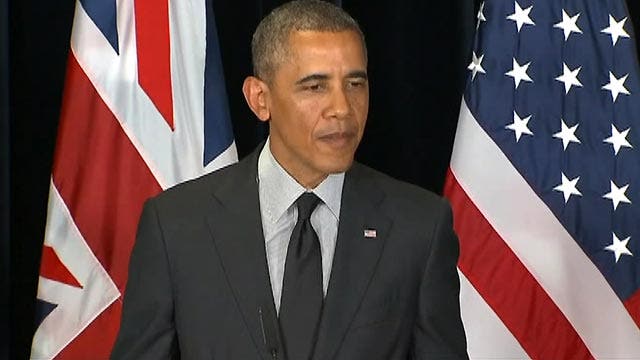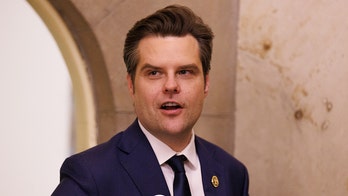Did Obama imply the Bergdahl uproar is a 'phony scandal'?
President said he wasn't surprised by controversies 'whipped up in Washington,' but the potential danger of the released in Bergdahl prisoner swap - and the soldiers who died searching for the POW - are real
There is, in politics, something called the art of the walkback.
The Obama White House, I feel confident in saying, isn’t very good at it.
The administration has done its share of pushback during the furor over Bowe Bergdahl. But there has been no acknowledgment, none, of any missteps or even that the soldier who deserted his post had been oversold as a hero.
It was Susan Rice, famous for the Benghazi talking points, who blew another round of Sunday show appearances, in my view, by declaring that Bergdahl had served with “honor and distinction.” Much of the media’s reporting, especially in interviewing fellow soldiers who bluntly branded him a deserter, has clearly disproven that description.
So when CNN’s Jim Acosta grabbed Rice at the D-Day anniversary in Normandy, she could have qualified her initial remarks. Instead, she staunchly defended them:
“What I was referring to is the fact that this was a young man who volunteered to serve his country in uniform at a time of war. That in itself is a very honorable thing.”
Acosta pushed back: “But ‘honor and distinction?’”
“Jim, really,” Rice said. “This is a young man whose circumstances we are still going to learn about.”
Stop the tape. Yes, there are unanswered questions. But can any reasonable person now deny that Bergdahl, whatever his motivation, walked away from his unit in Afghanistan? Why not acknowledge that in some fashion? The fact that we don’t know everything that happened didn’t stop the president from staging a celebratory event at the White House, or Rice from praising him.
Rice added: “He is, as all Americans, innocent until proven guilty. He is now being tried in the court of public opinion after having gone through enormously traumatic five years of captivity. His parents, the same.”
Now I’ve said that while I’m not a fan of Bob Bergdahl, I think the media should cut him some slack given the ordeal he’s been through. And it’s true that the press should not be court-martialing his son, who we haven’t heard from as he is recovering from his five-year captivity.
In fact, the New York Times yesterday confirmed James Rosen’s report that Bergdahl had been held in a cage for part of his captivity, and “now is physically able to travel he is not yet emotionally ready for the pressures of reuniting with his family,” according to unnamed American officials. So we’re not likely to hear his side for some time.
But it’s perfectly legitimate for journalists to try to find out everything they can about Bergdahl and his service, given that he’s at the center of a hugely controversial Taliban prisoner swap.
John Kerry also sidestepped the deserter question in an interview that aired yesterday on CNN. “There’s plenty of time for people to sort through what happened, what didn’t happen,” the secretary of State said. “I don’t know all the facts.”
The president has also refused to walk back the initial casting of Bowe Bergdahl as a hero, saying that “I make absolutely no apologies for making sure that we get back a young man to his parents, and that the American people understand that this is somebody’s child, and that we don’t condition whether or not we make the effort to try and get them back.”
There’s no problem with Obama saying we should leave no soldier behind on the battlefield. But by narrowly construing the question, the president made not even a nod to the storm of criticism or the accounts of desertion by a half-dozen fellow soldiers.
What if he had said he is troubled by the reports of desertion and these will be fully investigated, but the important thing was to rescue an American in uniform and he still believes he made the right decision? At least he would show he understands the anger that has surrounded the Bergdahl matter.
Brian Williams tried during in an interview in Normandy, asking specifically why Obama had failed to inform key members of Congress—and whether Bergdahl indeed served with “distinction and honor.”
The president made clear he was going to ignore the question—“Brian, I have to tell you the same thing I’ve been saying for the last several days”--and repeated his standard talking point about the “rule” of bringing back soldiers. When Williams tried again on the Hill question, Obama said only that “we had to act fast in a delicate situation.”
(NBC cut the second part of Williams’ question, about “distinction and honor,” probably because Obama didn’t address it.)
Perhaps the administration’s view is that giving an inch would embolden the critics and amount to an admission of failure (as we saw in the stubborn defense of both Kathleen Sebelius and Eric Shinseki). Yet the president would appear more in touch with the legitimate criticism surrounding this case in general and Bergdahl in particular.
But that would amount to a walkback, and this president avoids those at all costs.





